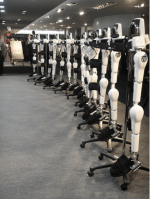The DEMO Spring 2011 conference kicked off yesterday in Palm Springs, featuring 27 startups in the consumer, enterprise, and cloud sectors. Each company was allowed six minutes to make their presentation and try to wow the audience with their product launches.
Some let their products do the talking, while others added humor to their pitches. For example, Dr. Shamus Husheer, inventor of the technology behind DuoFertility — a monitor that helps couples struggling to conceive — began by saying, “my name is Shamus, and my job is to get millions of women pregnant”.
From mind-reading headbands and Coinstar receptacles for your old electronic devices to applications that protect your Facebook page from spam, here (in no particular order) are introductions to 7 of the most interesting companies from Day 1.
![]() AboutOne: AboutOne is a secure online family management system that makes it easier to organize your family life. Targeting valuables like household information and memories, the platform enables you to store digitized pictures, video, and text, and access this information anytime from any web-enabled device. The service also allows you to store digital scans of children’s artwork, create photo albums from your family pictures, store insurance contracts, as well as keep track of anniversary dates, birthdays, and post instructions to the family baby sitter. Connecting with other services via API, AboutOne takes away the need to input all of this information manually. Enter your car’s VIN number, for example, and AboutOne is able to automatically import the model, make, year, etc. into its system. Founder & CEO Joanne Lang was previously on the cloud team at SAP, and though the demo wandered a bit, AboutOne seems to be assembling features that you would otherwise have to go to multiple different services to employ, so the future may be bright for AboutOne.
AboutOne: AboutOne is a secure online family management system that makes it easier to organize your family life. Targeting valuables like household information and memories, the platform enables you to store digitized pictures, video, and text, and access this information anytime from any web-enabled device. The service also allows you to store digital scans of children’s artwork, create photo albums from your family pictures, store insurance contracts, as well as keep track of anniversary dates, birthdays, and post instructions to the family baby sitter. Connecting with other services via API, AboutOne takes away the need to input all of this information manually. Enter your car’s VIN number, for example, and AboutOne is able to automatically import the model, make, year, etc. into its system. Founder & CEO Joanne Lang was previously on the cloud team at SAP, and though the demo wandered a bit, AboutOne seems to be assembling features that you would otherwise have to go to multiple different services to employ, so the future may be bright for AboutOne.
 Manilla: Manilla is a free online account management service, which gathers your household bills, financial accounts, travel rewards, and subscriptions all in one place. Sign on once and access all of your accounts, and view your bills the way they look in hard copy. Manilla recently announced partnerships with Comcast and Citibank, yet, as there are quite a few automated payment platforms already up and running, Manilla’s success will depend on its UI and how quickly it can bring all of the big banks and utility companies into the fold.
Manilla: Manilla is a free online account management service, which gathers your household bills, financial accounts, travel rewards, and subscriptions all in one place. Sign on once and access all of your accounts, and view your bills the way they look in hard copy. Manilla recently announced partnerships with Comcast and Citibank, yet, as there are quite a few automated payment platforms already up and running, Manilla’s success will depend on its UI and how quickly it can bring all of the big banks and utility companies into the fold.
 ecoATM: If the folks at ecoATM are correct in saying that 500 million electronic gadgets are purchased yearly — and that this number will only continue to grow — the market for recycling these devices is enormous. Enter ecoATM, the Coinstar for electronic devices. ecoATM is a self-serve recycling kiosk that buys back consumer electronics. Using its “patented machine vision, electronic diagnostics, and artificial intelligence”, ecoATM assesses the pristine or crappy condition, maker, and year of your device. It then ascribes a price and offers you the chance for instant cash back or store credit. The large device manufacturers have the infrastructure and manpower to potentially win this race in the long haul (take Verizon’s Trade-In Program, for example), but cash-back and a quick-to-market strategy could build gain ecoATM some serious traction.
ecoATM: If the folks at ecoATM are correct in saying that 500 million electronic gadgets are purchased yearly — and that this number will only continue to grow — the market for recycling these devices is enormous. Enter ecoATM, the Coinstar for electronic devices. ecoATM is a self-serve recycling kiosk that buys back consumer electronics. Using its “patented machine vision, electronic diagnostics, and artificial intelligence”, ecoATM assesses the pristine or crappy condition, maker, and year of your device. It then ascribes a price and offers you the chance for instant cash back or store credit. The large device manufacturers have the infrastructure and manpower to potentially win this race in the long haul (take Verizon’s Trade-In Program, for example), but cash-back and a quick-to-market strategy could build gain ecoATM some serious traction.
 NeuroSky: NeuroSky are the makers of a futuristic brain and attention-scanning device that looks, in practice, like a BlueTooth headset for your noggin. NeuroSky calls their device “exercise equipment for children’s minds”, as it works by monitoring electrical EEG brainwaves from the forehead, which then pass through algorithmic functions to determine the intensity of mental states like “relaxation” and “attention.” The company has said that the technology will be used in a number of different products that target ADD and ADHD. (A large reason this one is so close to my heart. Well, brain.) NeuroSky then allows the user to connect to one of ten educational, neuroscience apps, designed to help kids learn math and to improve their focus — all by playing games. Will this help fight the shrinking modern attention span? I hope so.
NeuroSky: NeuroSky are the makers of a futuristic brain and attention-scanning device that looks, in practice, like a BlueTooth headset for your noggin. NeuroSky calls their device “exercise equipment for children’s minds”, as it works by monitoring electrical EEG brainwaves from the forehead, which then pass through algorithmic functions to determine the intensity of mental states like “relaxation” and “attention.” The company has said that the technology will be used in a number of different products that target ADD and ADHD. (A large reason this one is so close to my heart. Well, brain.) NeuroSky then allows the user to connect to one of ten educational, neuroscience apps, designed to help kids learn math and to improve their focus — all by playing games. Will this help fight the shrinking modern attention span? I hope so.
 CVAC Systems, Inc: Straight out of “2001: A Space Odyssey” comes this newfangled pod that simulates high-altitude living. The so-called Cyclic Variations in Altitude Conditioning (CVAC) process apparently improves your fitness by applying “precisely composed rhythm-based changes to pressure, temperature and density of air” to your body as you sit in the egg-shaped pod. According to CVAC, its technology promotes longevity (adding years to your life), especially for those with diabetes. Supposedly, the combination of exercise and high altitude conditioning offers an array of health benefits. To their credit, CVAC cited numerous scientific studies to support their claims, but for now, it still requires a leap of faith.
CVAC Systems, Inc: Straight out of “2001: A Space Odyssey” comes this newfangled pod that simulates high-altitude living. The so-called Cyclic Variations in Altitude Conditioning (CVAC) process apparently improves your fitness by applying “precisely composed rhythm-based changes to pressure, temperature and density of air” to your body as you sit in the egg-shaped pod. According to CVAC, its technology promotes longevity (adding years to your life), especially for those with diabetes. Supposedly, the combination of exercise and high altitude conditioning offers an array of health benefits. To their credit, CVAC cited numerous scientific studies to support their claims, but for now, it still requires a leap of faith.
 Ajax Cloud9 IDE: Ajax’s Cloud9 IDE is a cloud-based integrated development environment (IDE) for JavaScript developers that supports HTML5, Python, Ruby, and PHP. The environment will allow developers to build apps and create projects that can be accessed, edited or shared anytime, anywhere. Thanks to the cloud, all you need to operate the environment is a browser and a computer, removing the burden of managing and maintaining large developer infrastructures. During their demo, Cloud9 said that Mozilla would be merging its Skywriter project with their technology and that they are in talks with IBM about Eclipse. If these claims are true, HTML5 developers might soon be on Cloud9. Ey-oh!
Ajax Cloud9 IDE: Ajax’s Cloud9 IDE is a cloud-based integrated development environment (IDE) for JavaScript developers that supports HTML5, Python, Ruby, and PHP. The environment will allow developers to build apps and create projects that can be accessed, edited or shared anytime, anywhere. Thanks to the cloud, all you need to operate the environment is a browser and a computer, removing the burden of managing and maintaining large developer infrastructures. During their demo, Cloud9 said that Mozilla would be merging its Skywriter project with their technology and that they are in talks with IBM about Eclipse. If these claims are true, HTML5 developers might soon be on Cloud9. Ey-oh!
![]() Websense’s Defensio for Facebook: Defensio for Facebook is an app that provides companies with active Facebook and other social network accounts added security measures for preventing unwanted content, spam, and spyware. Thanks to the ease and low cost of creating fake applications for Facebook, many brands and companies watch as their pages suffer from an overload of spam. Using Websense’s monitoring and analytics technology, Defensio offers the user a host of cloud-based configuration tools, allowing you to moderate the comments on your page, Facebook Wall, news stream, photos, and block the content you don’t want. You can also choose from, or input, a list of sites you don’t want your page to link to or language you may not want to appear — and you can have Defensio monitor multiple pages. Very cool.
Websense’s Defensio for Facebook: Defensio for Facebook is an app that provides companies with active Facebook and other social network accounts added security measures for preventing unwanted content, spam, and spyware. Thanks to the ease and low cost of creating fake applications for Facebook, many brands and companies watch as their pages suffer from an overload of spam. Using Websense’s monitoring and analytics technology, Defensio offers the user a host of cloud-based configuration tools, allowing you to moderate the comments on your page, Facebook Wall, news stream, photos, and block the content you don’t want. You can also choose from, or input, a list of sites you don’t want your page to link to or language you may not want to appear — and you can have Defensio monitor multiple pages. Very cool.
![]() Nimble: Nimble is a social relationship manager, which you can use to easily connect your contacts, calendars, and communications. The platform integrates with your mail, Facebook, Twitter, and LinkedIn accounts, bringing them into one environment and allowing you to see all of your connections with a particular person across all of those media. If, for example, someone sends you an email, it can pull up any previous conversations with them from any platform, or if you aren’t familiar with the person, you can pull their info from social networks. Nimble is free for individuals, but requires a small fee for the paid features that come with company plans and small groups. The company is aiming to make it easier for brands to interact and converse with their customers. With a seamless UI and deep integration with all social networks, Nimble could become a highly usable platform. I’m excited to test it.
Nimble: Nimble is a social relationship manager, which you can use to easily connect your contacts, calendars, and communications. The platform integrates with your mail, Facebook, Twitter, and LinkedIn accounts, bringing them into one environment and allowing you to see all of your connections with a particular person across all of those media. If, for example, someone sends you an email, it can pull up any previous conversations with them from any platform, or if you aren’t familiar with the person, you can pull their info from social networks. Nimble is free for individuals, but requires a small fee for the paid features that come with company plans and small groups. The company is aiming to make it easier for brands to interact and converse with their customers. With a seamless UI and deep integration with all social networks, Nimble could become a highly usable platform. I’m excited to test it.
Photo credit: Rodrigo Peña
